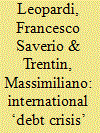| Srl | Item |
| 1 |
ID:
186164


|
|
|
|
|
| Summary/Abstract |
Algeria’s integration into the global neoliberal economy accelerated in the context of debt servicing problems. International Financial Institutions supported such integration through a reform agenda based on the ‘Washington Consensus’. This article highlights how Algeria’s military-bureaucratic elites influenced the process thanks to their understanding of the main principles that informed it. This underscores the problematic aspects affecting the intervention of the International Monetary Fund (IMF) and the World Bank. Thanks to the study of the IMF, World Bank and Algerian primary sources, this essay argues that Algeria managed to rebalance its position towards international creditors. The IMF and World Bank-sponsored programmes not only supported the regime during a civil conflict against jihadist insurgents. They also favoured the renewal of neopatrimonial mechanisms keeping Algeria’s military-bureaucratic elites in power. Exploring the management of financial assistance, is fundamental to understand how Algeria did not address historical socio-economic problems paving the way for renewed popular contestation and financial hardships.
|
|
|
|
|
|
|
|
|
|
|
|
|
|
|
|
| 2 |
ID:
186158


|
|
|
|
|
| Summary/Abstract |
The year 2022 marks the fortieth anniversary of the 1982 Mexican debt crisis, the first of a long series of financial turbulences that would soon spread to most of the developing world and beyond. Ever since, international historiography has produced a wide arrange of analyses that, despite their diversity, came to see the 1980s international debt crisis as a momentous event through which the United States and Western Europe reimposed their financial hegemony over the decolonised world and socialist camp. The contributions to this special issue of Middle Eastern Studies primarily aim at reassessing the process that brought economic neoliberalism throughout the Middle East and North Africa (MENA) in the context of debt crises. In particular, they challenge ‘teleological’ views that see the opening to market economy as a result of the creditors’ agenda, thus depriving actors in debtor countries of their agency. The essays published herein explore the levers, instruments and policy-making process to which debtor states resorted to shape their own integration process in the global neoliberal economy.
|
|
|
|
|
|
|
|
|
|
|
|
|
|
|
|